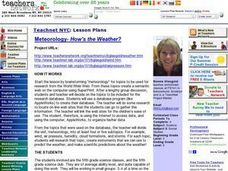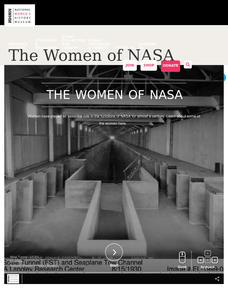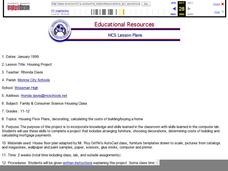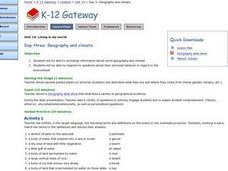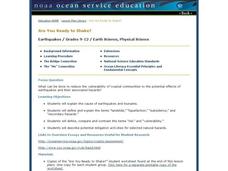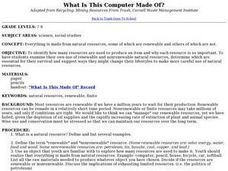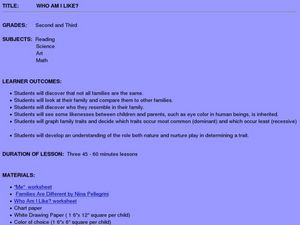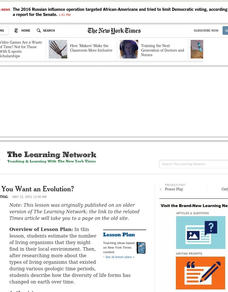NOAA
Into the Deep
Take young scientists into the depths of the world's ocean with the second lesson of this three-part earth science series. After first drawing pictures representing how they imagine the bottom of the ocean to appear, young scholars...
Curated OER
Science: How's the Weather?
Fifth graders brainstorm meteorological terms to create a semantic web using SuperPrint. For each topic, they create instruments, such as barometers or psychomotors, that they use to make scientific predictions about the weather. After...
National Woman's History Museum
The Women of NASA
Human computers? Although it may sound like science fiction, the term was used to describe the women who made the NASA calculations before the advent of electronic computers. A 21-slide presentation introduces viewers to the women who...
Curated OER
The "Science" of Racism
How can we keep racism out of our society? Analyze the factors that lead to racism today and research previous scientific findings that impacted social policy. Your high school students identify ways to prevent past mistakes from...
Curated OER
Housing Project
Find everything you need for a two-week home construction simulation project for your high school economics class. They come up with the plans for a custom home including the cost per square foot, interest rate, mortgage term, down...
Curated OER
English Exercises: The Significance of Science in Society
In this significance of science in society worksheet, 8th graders read 3 paragraphs, then interactively answer 9 comprehension and grammar questions, with immediate online feedback; video at the beginning is not longer available, but the...
Curated OER
Talking Trash
Define vocabulary related to global waste. Creative thinkers review and illustrate terms for the Global Garbage Picture Dictionary. They play a vocabulary game in which co-operative skills among players in encouraged. A great way to...
Curated OER
Geography and Climate
Young scholars investigate geographical locations and their own personal experiences with the environment. In this environmental identification lesson, students participate in a match game using certain environmental and...
Curated OER
Venerable Inventors
Students discuss important historic inventors and read their biographical information. In this world history lesson, students describe Alexander Bell, Thomas Edison, and Guglielmo Marconi using vocabulary terms used in their text....
Edgate
Discovering New Resources
What is a natural resource, and what resources did the Lewis and Clark expedition seek? After reading an article on the mapping of the west, learners get into small groups to discuss the important natural resources of the period. They...
Curated OER
Are You Ready to Shake
High schoolers examine earthquakes and tsunamis. In this Earth science lesson, students investigate the causes and hazards associated with earthquakes and tsunamis.
Curated OER
HISTORICAL AND SOCIAL SCIENCES ANALYSIS
Students examine a variety of maps and documents to identify physical and cultural features of neighborhoods, cities, states, and countries, to explain the historical migration of people, expansion and disintegration of empires, and the...
Curated OER
What Is This Computer Made Of?
Learners identify how many resources are used to produce an item and why each resource is so important. They examine their own use of renewable and nonrenewable natural resources.
Curated OER
Climate Change in My City
Students investigate the climate changes occurring locally, regionally and globally over the last one hundred years. They brainstorm and predict whether the current year's weather was warmer or colder than last year then check the...
Curated OER
Cyber-crime
Students discuss what types of Internet activity are or should be considered criminal, examine how criminal prohibitions against certain types of Internet activity are best implemented in law, determine whether computer crimes are unique...
Curated OER
Trees of Mississippi
Students research tree species found in Mississippi, and record the tree types, numbers of trees, and locations. Students then research the forest industry sites, and determine possible relationships between industry location and tree...
Curated OER
Watershed Documentary
Students conduct research and collect data about a local watershed area. They create an iMovie showing the human and natural impacts on the creek and watershed areas.
Curated OER
The Presidential Nominating System
High schoolers examine the process by which candidates for U.S. president are nominated by the Democratic and Republican parties. They identify the differences between primaries and caucuses and key terms and issues related to the...
Curated OER
Who Am I Like?
Students examine family structures. In this family structure lesson, students discover things about their own families and those of their classmates. They make a chart as they discuss nature versus nurture, complete a worksheet about who...
Curated OER
Getting into Hot Water
Young scholars discuss the effect of global warming on bodies of water after reading "An Icy Riddle as Big as Greenland" from The New York Times. Students work in groups to research topics related to global warming and Greenland's...
Curated OER
Clearing the Air
Students read a New York Times article and investigate a variety of emissions that contribute to global warming. They participate in a mock international summit in which they present recommendations for reversing the global warming trend.
Curated OER
In the Wake of a Storm
Students share thoughts about the effects of Hurricane Katrina on Louisiana's natural environment. They read an online article and write proposals to save Mississippi River marshlands.
Curated OER
Power Plans
In this lesson, young scholars consider what they already know about nuclear power and its uses and then examine an accident at a nuclear power plant. They then research and create reports on nuclear energy.
Curated OER
You Say You Want an Evolution?
Young scholars estimate the number of living organisms they might find in their local environment. After researching the types of organisms that existed during various geologic time periods, students describe how life forms have changed...

